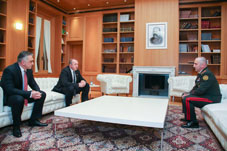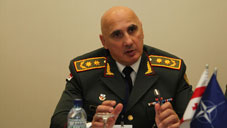
New chairperson for Georgian Armed Forces General staff
By Gvantsa Gabekhadze
Wednesday, November 23
Brigadier General Vladimer Chachibaia, the ex-head and deputy-head of the General Staff of Georgia’s Armed Forces and First Georgian General advising the UN Assistance Mission in Afghanistan, will lead the body over the following three years, as the term of Major General Vakhtang Kapanadze has expired.
Kapanadze will remain in the Georgian Army and will be appointed as the country’s top military representative to NATO.
Statements over the issue were made late on November 21 at the meeting of Georgia’s National Security Council under the President of Georgia.
Chachibaia’s candidacy was raised by Minister of Defence Levan Izoria who stressed his and Chachibaia’s vision “coincided” on a range of military issues, tasked to address state security topics.
President Giorgi Margvelashvili, who was authorized to officially nominate the man in the post, stated he had had previous talks with the new head of the General Staff.
Chachibaia’s appointing for the position was welcomed by Georgia’s ex-Defence Minister Tinatin Khidasheli, who described the new chairperson as a “man with high-class western education and genuine experience in the army issues”.
Khidasheli stressed that Chachibaia was promoted when she served as the Minister of Defence last year as he was “a very-qualified military figure with relevant experience of working with Georgia’s foreign allies”.
His previous posts also include the head of GAF (2008-2009) and Deputy Defence Minister (2009) under the previous United National Movement leadership.
In 2014-2015, he served as the deputy head of the GAF under the Georgian Dream leadership.
He received his military education in Georgia and the United States, and was advising the UN mission in Afghanistan in 2015-2016.
At yesterday’s meeting the country’s top figures also discussed the issue of the restoration of mandatory military conscription by the Ministry of Defence, which recruits only about 25 percent of total conscripts annually, while the remaining percentage are taken by the Interior Ministry and the Ministry of Corrections.
Izoria stressed that Khidasheli’s decision to abolish the mandatory conscription by the Ministry of Defence was “a fast and a populist decision”.
Speaking about the issue, President Giorgi Margvelashvili said in general he supported the idea of the Georgian Army’s full move to contract-based military service, but if it happened before the end of the year the step would cause a manpower shortage in the armed forces.
The President said the Minister of Defence would present a plan in mid-December about the Defence Ministry’s vision of the military conscription and similar.
Khidasheli has already criticized Izoria for restoring of the military conscription which, according to her, forces Georgian youngsters to serve in the army, when military service must be based on a person’s free will.


